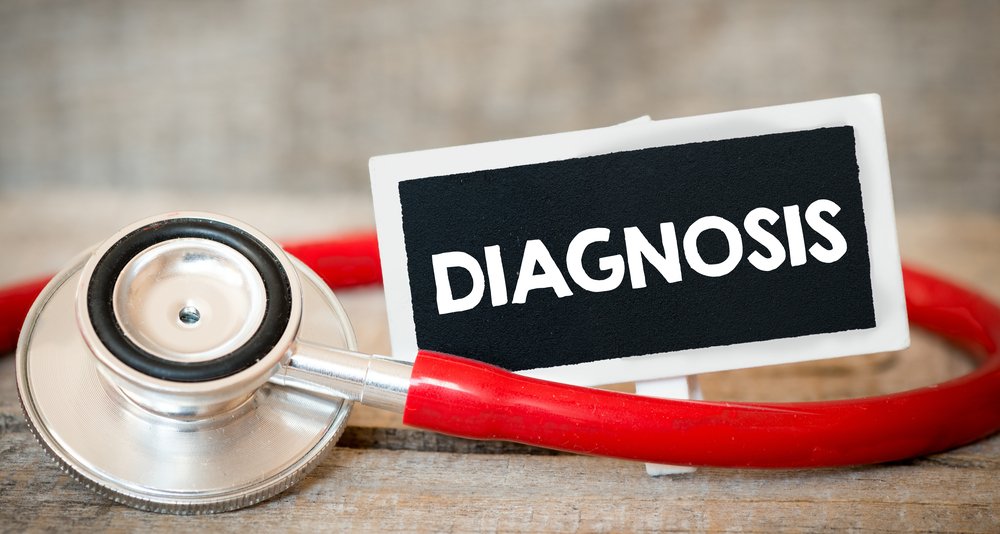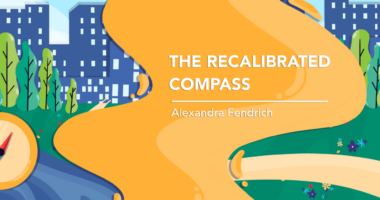When ‘Imagined’ Pain Becomes a Real Diagnosis

I showed up at my doctor’s office with stickers all over my back.
The pain usually was most severe in the middle of the night. Yet, I was always surprised by how difficult it was to recall my nighttime pain in the daytime. In the past, I had tried to make detailed mental notes of the pain I felt, but I didn’t believe I was giving the doctor an accurate or sufficiently detailed picture.
“About right here, and here, and here,” I once told the doctor, which was hardly convincing.
On this particular day, I was determined to show the doctor exactly where my pain was. My husband had kindly helped me put stickers all over my back. I wrote special notes about exactly what the pain felt like for each numbered sticker. I showed up prepared, and I was so hopeful that the additional details I provided would give the doctor some sort of clue as to what was ailing me.
I thought I might have torn muscles or injured joints. But from what? I didn’t know.
As it turned out, the stickers weren’t very helpful, because by the time I got to the doctor’s office, the pain had shifted. I now had a splitting headache, and my neck was so stiff I had trouble shoulder checking during my drive over to the clinic.
The fact that I didn’t have a straight-up answer to where the pain was and what it felt like created the impression that I was imagining it all. Some doctors hinted at this, using my excellent X-ray and blood test results to solidify their belief that nothing was wrong with me. Several health professionals suggested I “try relaxing” and getting more sleep.
But my inability to sleep due to pain was precisely part of the problem. One health professional told me, “Sometimes we start thinking we have pain even though there is no evidence of it.” I wondered if the doctors were right. Was the pain truly in my head?
After years of unsuccessfully treating localized pain and having several particularly poor nights, I showed up at my doctor’s office with tears of frustration. It hurt just to breathe. Plus, constantly living in pain with no relief in sight was taking its toll.
This time, however, I was determined to leave my appointment with a new direction toward answers. Familiar with my health journey, my doctor said the last option he could think of was to send me for an MRI of my spine. I felt a renewed sense of hope as I left the clinic that day, despite having to wait almost a year for the MRI.
On the afternoon of Saturday, Nov. 2, 2019, I got a call from my family doctor. I was resting in bed at the time and sat up to answer the call. He said, “Good news, you don’t need back surgery. However, something’s not right, as the MRI results show multiple corner bone marrow edema-like foci which suggest evidence of inflammatory spondylitis. I’m going to send the results off to a rheumatologist to see if they have any advice. Whatever it is, you can rest assured that you don’t have to live in pain for the rest of your life and that there are treatment options.”
This was the first time my pain was supported by visible evidence. I felt validated. My first emotion was relief. My head wasn’t imagining all my pain.
Like any “normal” person would do, I started Googling spondylitis and stumbled upon something called ankylosing spondylitis. Upon reading about ankylosing spondylitis, I self-diagnosed. The suspicion of my diagnosis was confirmed by a well-respected rheumatologist nearly five months later.
On that day in early November, I stopped thinking of myself as a healthy person with chronic pain. I became a sick person with an incurable disease. In some ways, I allowed the disease to become a self-fulfilling prophecy in my life. I expected it to progress, and I expected to feel worse. That’s what the textbooks and Google had told me would happen. The pain got progressively worse. The disease won.
In hindsight, I wish I wouldn’t have let AS become part of my identity. A positive attitude when dealing with our diagnoses doesn’t take the physical pain away, but it does give us the energy and courage to prevent the disease from trampling us.
Ankylosing spondylitis was my diagnosis, not my identity. After taking some time to grieve the diagnosis, I pulled up my bootstraps and decided I wouldn’t let this disease progress without a fight.
***
Note: Ankylosing Spondylitis News is strictly a news and information website about the disease. It does not provide medical advice, diagnosis, or treatment. This content is not intended to be a substitute for professional medical advice, diagnosis, or treatment. Always seek the advice of your physician or other qualified health provider with any questions you may have regarding a medical condition. Never disregard professional medical advice or delay in seeking it because of something you have read on this website. The opinions expressed in this column are not those of Ankylosing Spondylitis News, or its parent company, Bionews, and are intended to spark discussion about issues pertaining to ankylosing spondylitis.







Andrea Wyckoff
Janneke, you are such a talented writer! Your AS story reminds me so much of mine, and as I read along, I feel like I am right there with you. You tell a painful story so beautifully!
Janneke Phung
Andrea, your words are so encouraging. Thank you! <3
George
Janneke, this is George again and I love your writing style and your positivity! Many of my experiences mirror yours and because (until I got completely destroyed) I was able to perform physically, I could never get recognition for what I what going through. I exercised because I knew it was essential for me and exercise was virtually the only thing that allowed me to feel good when I did. I had a rheumatologist tell me I had nothing in his field, yet he still had the audacity to dump fibromyalgia on me. I knew better. He was far from the only one who was the opposite of helpful. The lumbar MRI I got that revealed the AS to the the radiologist included the lower spine and it came after MRI’s of my cervical spine and of both shoulders. I had to beg and beg to get the lumbar MRI and ironically I had done so because my problems were also in my legs. There was enough detail on the MRI that two separate doctors completely missed that AS was stated. I should be forgiven for missing it too (when I finally got my hands on the MRI’s) but fortunately for me, I submitted requests for copies of the MRI’s which I eventually handed to a rheumatologist who read them. When I finally got my diagnosis, it was critically helpful and after a couple months, I was able to start on biologics which saved my life. Before that, I had remained as positive as humanly possible and I had used every mental persuasion I had in me to overcome this disease. If there was a way, short of biologics, I would have found it. There wasn’t. Which is why, only your one statement did not apply to me: “ A positive attitude when dealing with our diagnoses doesn’t take the physical pain away, but it does give us the energy and courage to prevent the disease from trampling us.” For me, I had to give AS the respect it warranted, it earned. I did not lose, but AS had won. Thank God it wasn’t final. We definitely need the positive attitude and healthy lifestyle, but I needed luck and serious help too.
Janneke Phung
George - thank you for coming back to read more of my story and for sharing more of yours! I know we aren't the only ones who have to fight for a diagnosis and that journey is so demoralizing, exhausting, and painful for many people. It sounds as though the diagnosis was a turning point for you as well. What a relief it is to finally have some direction and to finally be taken seriously! As we agreed upon before, ankylosing spondylitis presents itself so differently in all individuals who suffer from it and I most certainly don't want to suggest that we suffer the same amount or in the same way. Our journeys, like our symptoms, are so different, and in the end, we all need to do what we believe is best given our unique situations.
I applaud you for making it to the point where biologics finally provided you with relief - that took courage and strength. Yes, AS is mean and I don't want it to sound like I was always positive while on the journey (just ask my husband!). If you continue to read my story you might find that you'll be able to relate less and less to my journey. Quite frankly, I fully intended to take biologics but because the wait to see a rheumatologist was months long I decided to throw myself into other options for possible pain relief as I waited for my initial appointment. I am so grateful that I found significant relief as I don't think I could have waited the months in the agony and pain I was experiencing. Yes, AS also brought me to my knees (and it's the only reason I can continue with the extremely drastic change of diet and lifestyle I am currently living). Thankfully, we've each found ways to get up again and that's what's most important!
Wishing you a meaningful and joyous Christmas season, George! You'll see my next column published after the holidays, on January 14th.
George
Thank you for your reply Janneke, I look forward to learning more of your encouraging story! I didn’t have to wait even a week for the biologic to have effect. Within days I knew I was being transformed from being stiffer than petrified cardboard and having inflammation roll and scream through my body to getting massive relief. Night and day. Life and death. I also have severe bowel problems so my diet had long been under intense scrutiny and was optimized. Most of my labs were and are optimal even for a young person, which I am not. My vulnerability was AS and too many favorable genes which apparently doesn’t include the marker.
Janneke Phung
If I'd had access to biologics at the time I would have, hands down, gone for it. I wanted immediate relief. I am so glad it worked for you!
I most certainly cannot claim to have had such immediate transforming results from changing my diet and lifestyle! I felt like it was two steps forward and one step back for a few months. However, in hindsight, I am thankful for the ridiculous wait times to see rheumatologists around here as it gave me the time to try something different. I am thankful to have biologics in my back pocket in case one day I need them. For now, I am grateful that I am living life without AS symptoms while being able to avoid the risks and side effects that come with medications.
George
Your thoughts and you sharing your story are wonderful and appreciated!